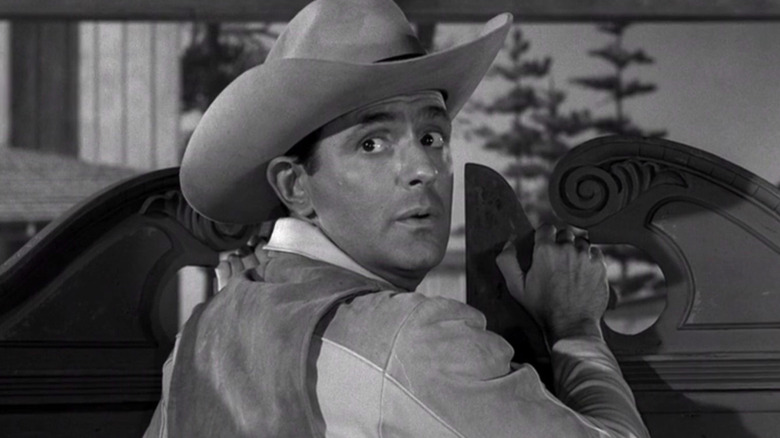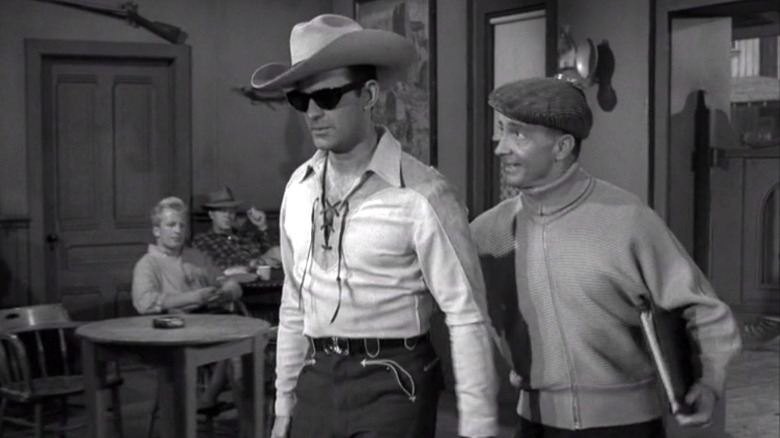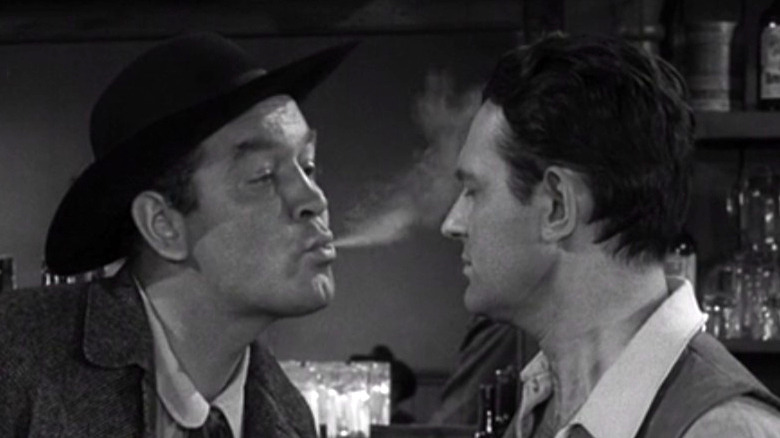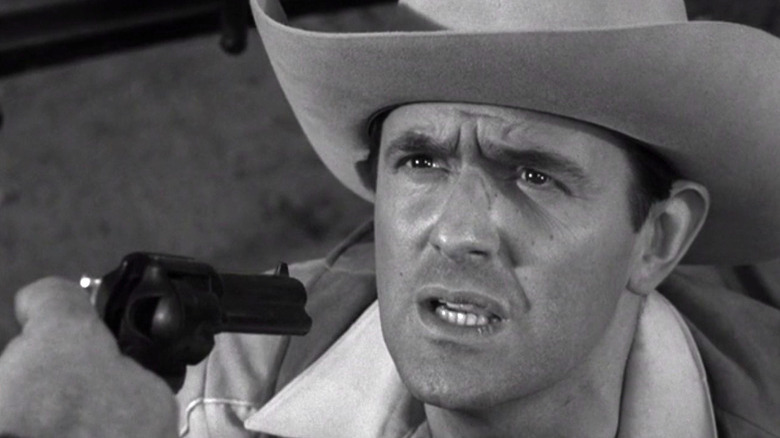This Episode Of The Twilight Zone Was A Harsh Critique Of Hollywood Westerns
If you pay attention to film and television history you'll learn a thing or two, like how all trends fade away over time. It was only 10-15 years ago that YA movies like "Twilight" and "The Hunger Games" were all the rage, and Hollywood kept cranking out similar adaptations to capitalize on that craze. Not so much anymore. And for the last couple of decades superhero movies have ruled the roost, not just topping the box office but driving conversation about the entertainment industry, to the point where people can't even interview Martin Scorsese — who doesn't even make those kinds of movies — without interrogating him about it. That'll dissipate eventually too, at least a little bit. Such is the way of all things.
One great example is the enormous popularity of Western-themed television shows, which ruled the airwaves in the mid-20th century. In the 1958-1959 television season and in the 1959-1960 season, the three highest-rated shows in America were "Gunsmoke," "Wagon Train," and "Have Gun — Will Travel." Heck, in the 1959-60 season alone, other top-rated shows included "Wanted: Dead or Alive," "The Rifleman," "The Lawman," "Cheyenne," "Rawhide," "Maverick," "The Life and Legend of Wyatt Earp," and "Dick Powell's Zane Grey Theater." That's a heck of a lot of TV shows in one genre at a time when there were only three channels to choose from. Yes, the trend may have died down but it was a heck of a time to be making a TV western. They were incredibly popular.
And that made them perfect fodder for satire, even on a sci-fi series like "The Twilight Zone."
Once upon a time in the ... western
"The Twilight Zone" may be best remembered for its ironic twists and horrifying images, but the show's purpose wasn't to terrify its audience, it was to tell quality stories of in the weird fantasy and sci-fi genres. That meant that sometimes Rod Serling's award-winning series also produced comedy episodes, and sometimes they weren't just funny, they were biting satires.
"Showdown with Rance McGrew," the 20th episode of "The Twilight Zone's" third season, stars Tony Award-winning actor Larry Blyden as the title character, an actor starring in a TV western series where he hunts down real-life historical outlaws in exaggeratedly heroic ways, like jumping off of cliffs and onto their horses. The episode kicks off with McGrew driving his convertible onto the western set, throwing his weight around with the director, and showing off his fancy gun-twirling tricks before accidentally breaking the mirror behind the bar of the saloon. Incredibly, he manages to break the same mirror multiple times throughout the day.
He's about to shoot a scene where Jesse James tries to shoot him in the back — a plot point his co-star objects to, but McGrew insists on — when he suddenly finds himself in a real-life saloon, surrounded by real-life cowboys. That's when he meets the real Jesse James, who has been watching Western TV shows in the afterlife along with all of his outlaw friends, and they're not happy about them.
Not. Happy. At. All.
The character assassination of Jesse James by the coward Rance McGrew
Jesse James informs Rance McGrew, after completely emasculating him at every turn, that the real-life icons of the American West are sensitive people, and that the artistic liberties people like McGrew take with their life stories have become deeply insulting. James tells McGrew that sometimes, to be fair, he's gotta lose.
So the outlaw challenges the actor to a real gunfight, only to discover that McGrew is an incredible coward. He pleads for his continued life — and by extension, the life of the Hollywood Western, and every other story that oversimplifies history to depict a comforting but untrue idea of the national identity — by crying out, "You're killing an American institution!"
At the end of the episode, McGrew swears he'll do "anything" if Jesse James lets him live. James says it's a bargain, and returns McGrew to the soundstage. Except now there's someone new on the set: His agent, a reincarnated Jesse James, who now insists that Rance McGrew's character is going to get thrown out of a window and lose the fight at the end of the episode. And in the future, he's going to lose a lot more of his fights with real-life Western outlaws, who James insists are really nice people once you get to know them.
We've got a right to pick a little fight (with) Bonanza
It's not a particularly subtle critique of the Hollywood western, but it's a half-hour episode of TV, so the screenplay — written by series creator Rod Serling, based on an idea by Frederic Louis Fox (who also wrote episodes of westerns like "Black Saddle," "Johnny Ringo," and "Man Without a Gun") — is understandably a little punchy. At the very least it's impossible to ignore Serling's main point: that Hollywood creates an image of history through its movies and TV shows, and since you can't assume everyone in the audience does any research on their own, filmmakers have a responsibility to get it right ... at least some of the time.
But Serling was also interested in deconstructing the image of the Hollywood action star, who appears to be courageous and capable but is merely an actor playing pretend. "I used to think this about John Wayne all the time, who had fought most of our major wars," Serling says in The Twilight Zone Companion. "In truth, of course, they were fought on the backlot of Warner Brothers, in which the most deadly jeopardy would be to get hit by a flying starlet," said Serling, who was himself a World War II Army veteran. "And I always wondered what Wayne's reaction would be if he ever had to lift up an M-1 and go through a bloody foxhole on attack sometime."
The plight of Rance McGrew is the plight of any storyteller who takes their responsibilities for granted, and a helpful reminder that for every popular genre and fad in the entertainment industry, there won't just come a time to end, but there may come a time for a proper reckoning. It doesn't just matter if your movies and TV shows were popular, or even if they were well-made. It also matters that they were made by responsible people who cared about the impact their creations might have on the audience, and on the way that audience views history, the world, and the people who live (or have lived) in it.



